Launching an e-commerce store is the way to go for all South African businesses looking for the next frontiers of growth and opportunity.
South African e-commerce grew by 66% in 2020. According to MasterCard, online sales topped R30.2 billion last year and are expected to be around R42-billion in 2021.
If you want to be a part of the online shopping boom, choosing a platform to host operations on is one of the first decisions you have to make. Below is a comparison of eight popular e-commerce platforms available to South African businesses.
Here are the numbers of average monthly searches on Google for different e-commerce platforms in South Africa.
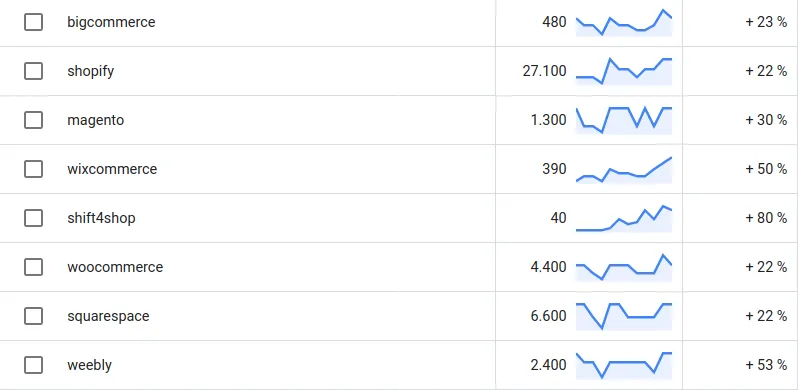
As you can see, there are significant differences in trends and search volumes. Read on to learn about features, advantages, disadvantages and prices of each platform. At the end of the article, we present the recommendations of our experts.
BigCommerce
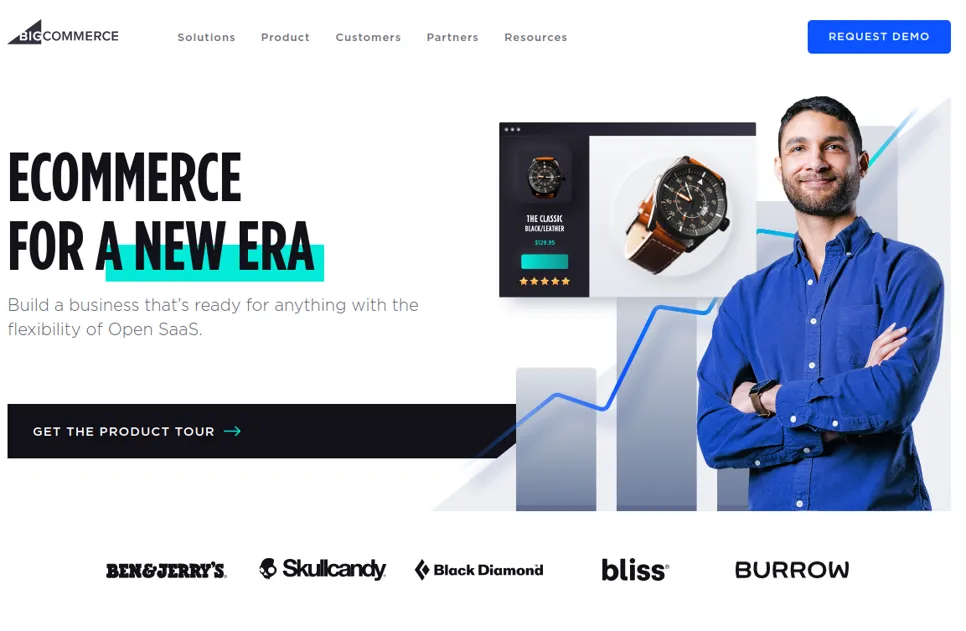
BigCommerce is by far the best e-commerce platform for businesses with large product catalogues. The robust product search engine makes it the ideal solution for retail brands and brick and mortar stores looking to establish themselves in online sales.
The platform is beginner-friendly and allows users with zero experience in web development to get by with customizable templates. It also comes with a handy partner directory that gives users the option to get help from a community of expert designers and developers.
For the more advanced users, BigCommerce allows edits to its HTML and CSS.
The entry-level plan for BigCommerce is $29.95 per month, which is around R450.00, depending on the exchange rate. The subscription fee allows you to create a store with any size catalogue, enjoy many excellent benefits, and have 24/7 support.
The entry-level plan is available to stores that make less than $50k a year.
Shopify
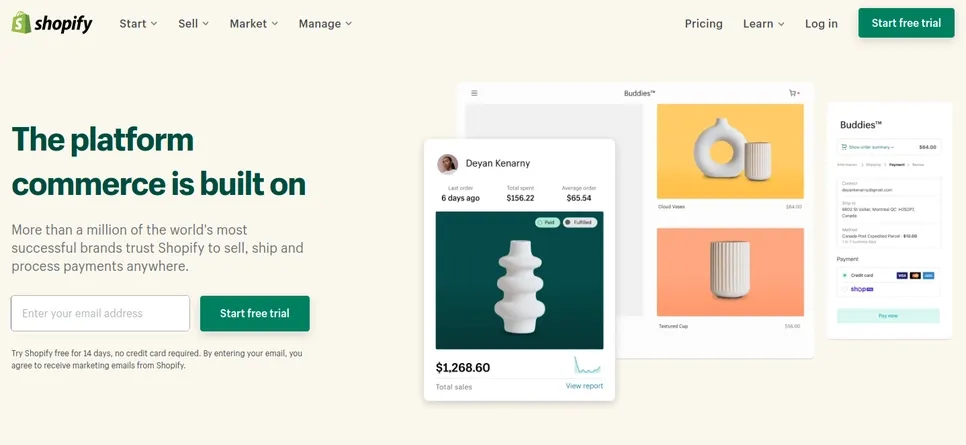
Shopify is another great option for South African businesses venturing into online sales. Shopify is good, but it has several drawbacks. The two that stand out are the small catalogue size and the limited set of effective marketing channels.
For users looking to rely on social media marketing strategies, Shopify is the best, but that’s about it. If your current operations are reliant on effective SEO, Shopify will leave you underwhelmed. Performance-wise, you could do better with a WordPress store or BigCommerce. Although Shopify does excel at promoting upsells to converted customers.
Shopify set-up is simple. The drag and drop interface and over 70 templates make it easy to go from idea to online store in no time at all. While Shopify does offer several free templates, the premium options will cost you well over a thousand rands or a couple of hundreds of US dollars.
The entry-level Shopify plan is $29 a month. It comes with 24/7 support, multiple staff accounts, and the ability to run your operations with up to 4 inventory locations. For businesses with small catalogues, the standard Shopify plan should be more than enough.
Magento
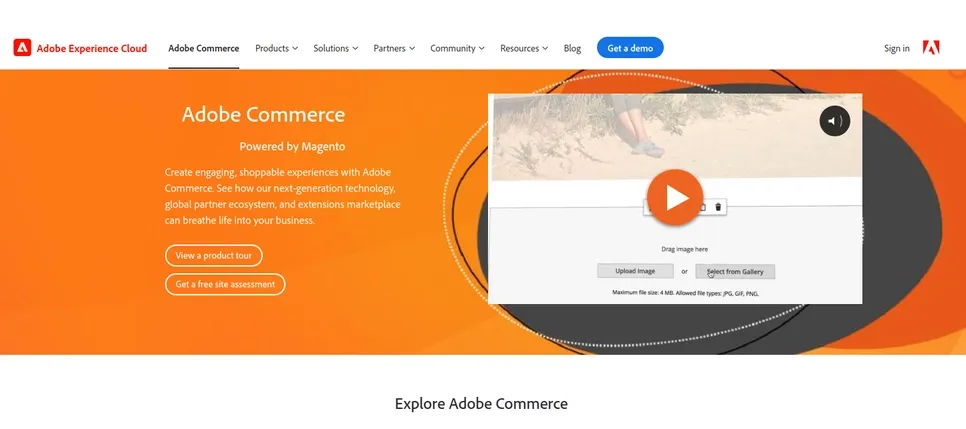
Magento is the go-to option for established South African businesses that want to make a splash in online sales. If you have a team of talented developers, Magento is the platform to create a unique experience for your customers.
Magento is free, but large enterprises can contact sales for custom solutions costing up to tens of thousands of dollars. Brands like Nike, P&G and Coca Cola use Magento for their operations. For small to medium-sized businesses, the free solution will be more than enough.
One of the best things about Magento is the community of developers that is always on hand to help and answer any questions. Magento's features, flexibility and scalability make it one of the best options for South African businesses of all sizes.
Get free quotes for e-commerce websiteWixecommerce

Wix has come a long way since its early days, and it has evolved into a decent solution for small businesses looking to get into e-commerce. For the most part, Wixecommerce is a work in progress. It continues to grow and address the issues it has battled since its start while adding features to make itself competitive.
As an e-commerce solution, Wix is not for large enterprises looking for seamless operations. In its current state, Wix is purely for beginners with minimal technical demands.
Store set-up is easy, and the customer support throughout the process is among the best you’ll find anywhere. There are well over 500 templates to choose from, and the drag and drop elements allow you to bring your vision to life. The unfortunate part about setting up your store is that making changes is hard.
Shift4Shop

Shift4Shop is a mainstay in the e-commerce space. It has been around since 2001 and has had to rebrand to bring it into the 21st century. For as long as it’s been around, they still have to figure some things out about the user experience.
Shift4Shop is hard to set up. The lack of a drag and drop function makes building your more difficult than it should be.
If you’re new to e-commerce, you’re better off going with one of the other platforms we’ve mentioned. Shift4Shop requires a considerable amount of experience to achieve anything of note.
Shift4Shops biggest advantage is that it offers one of the best shipping solutions around. It’s hassle-free compared to everything else.
Shift4Shop is free to use if you use the in-house payment process. The enterprise plan is $1,999 a month (R30.000,00), with a once-off setup fee of $500 (R7.500.00).
Request quotes for e-commerce website designWooCommerce
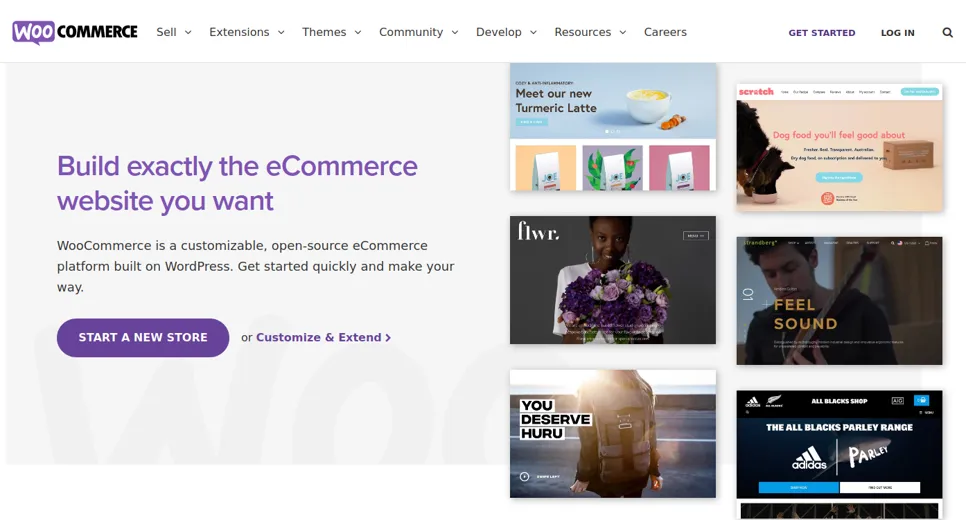
WooCommerce is a great e-commerce solution for South African businesses looking to move online. While it’s not purpose-built for e-commerce, it matches the performance of established platforms.
WooCommerce works with WordPress to turn any site into a functional e-commerce store. The biggest challenge you’ll face with WooCommerce is the ability to scale along with your operations. It's service is free.
If you have previous experience with WordPress, setup will be pretty straightforward. And there’s nothing a quick YouTube tutorial won’t fix if you run into some issues.
Premium templates and top of the range extensions can be expensive. But, if you’re starting small, you will get by on the freebies.
Squarespace

Squarespace is the perfect solution if you’re looking for a simple setup, light platform for your e-commerce business. It has a beautiful range of templates to work with. The drag-and-drop editor takes some getting used to, but once you have the hang of it you can build a stunning website.
Unlike some other e-com platforms, Squarespace offers a great range of website management capabilities to help you get the most out of your site. You can manage your marketing, inventory, and advertising and track your analytics within site. Another plus for Squarespace is that you get robust SEO tools to aid your other marketing channels.
Squarespace fails to compete with the more established platforms because of its limited ability to integrate with third-party apps. On top of that, they only offer support for Stripe and Paypal as payment processors, both of which are pretty difficult to use.
You can use Squarespace’s e-commmerce features on the business plan starting from $18 (R270.00) a month billed annually. For $26 (R390.00) and $40 (R600.00) a month, you gain access to a wide range of e-commerce capabilities, and you lose the 3% transaction on the $18 plan.
Weebly
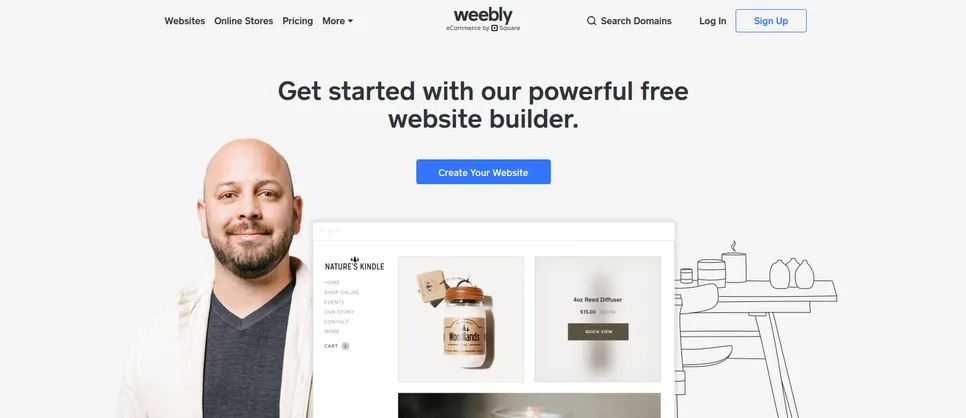
If you want an e-commerce platform that will let you flex your marketing prowess, Weebly is the way to go. It has built-in marketing automation to make selling easy, and you can set it up with the aid of a developer.
Weebly has a pretty decent drag-and-drop designer to help you with building your site. It comes with many free themes, and the premium ones will cost you about $50 or more, depending on the one you choose. Weebly's limitations are its SEO capabilities, the inability to sell digital products, and non-responsive themes.
You can access e-com functions on all of Weebly’s plans, but you’ll have to use the top-tier plan for $38 (R572.00) a month to get the most out of it. It will give you access to the custom shopping cart, coupons, inventory management, and other capabilities you need to run a decent e-commerce operation. You’ll also get a convenient mobile app for managing your store’s simple day-to-day aspects.
Get free quotes for e-commerce websiteExperts pick
We asked Mr Eduard Marais, CEO and founder of Kwikweb, and Mrs Sandy Joselyn, CEO of Giddyup, what platform they recommend to potential customers.
Eduard Marais: "Shopify, Wix, Weebly and Squarespace are great platforms, but they are hosted either overseas or on CDN (Content Delivery Networks), which is just a tad slower than locally hosted websites. If you want to sell online, your website must be lightning fast. I would recommend that clients use a platform that has local support and can be hosted locally (I can't stress 'local support' enough)."
I, therefore, recommend a WordPress website with the WooCommerce plugin if you have a budget of R5000+. - Eduard Marais, Kwikweb
"There are plenty of WordPress developers in South Africa, and WordPress websites can be hosted locally,” adds Mr Marais. His company Kwikweb offers its own local e-commerce platform if you are on a tighter budget.
Sandy Joselyn: “Some people prefer Shopify, but I find there are always some sneaky costs that creep in there. I would also stay away from Wix since the starter plan doesn't remove ads from your site, there are no unlimited plans, and SEO is a pain in the neck.”
I like to use WooCommerce. There are loads of great plug-ins that support all kinds of needs. There are no hidden costs as this is an open-source platform. - Sandy Joselyn, Giddyup
Our experts also have advice for you, if you need to decide on the best payment gateway for your e-commerce business.
Want to become one of Procompare professionals?







